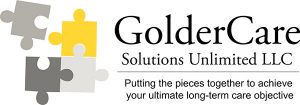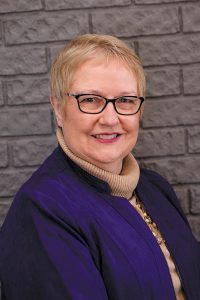January 1, 2025
Your Advocacy Connection

We Solve Long Term Care Problems
Happy New Year!
 By Gail Glockhoff-Long
By Gail Glockhoff-Long
GolderCare Solutions
Benefits Advocate
The start of a new year often inspires us to clear out the old and make a fresh start. Back when I worked at Modern Woodmen, the first Friday of January was designated as “New Year Fling Day.” We spent a few hours sorting through desks and storage areas, discarding outdated forms and unnecessary papers. In exchange, we were treated to lunch and got to wear jeans—a true win-win for both employees and employer.
January is a great time to de-clutter, whether you’re tidying up your own home or helping someone prepare for future care needs. When my siblings and I helped our parents downsize, we had differing views—some wanted to keep everything, while others believed anything with dust on it should be tossed. There is a middle ground, and the process requires thought and structure.
At GolderCare, we focus on sorting important papers for financial planning, qualifying for public benefits, and filing insurance claims. A common mistake we see is families cleaning out a loved one’s house, throwing away everything in a rush, only to later realize they’ve destroyed vital legal and financial paperwork needed for Medicaid. While many documents can be replaced, it’s a time-consuming and often costly process. The time delay could also mean paying the nursing home another month at private pay rate.
If you’re sorting through a home for someone who is, or will be, in need of care, take a systematic approach. Label a box “SAVE” in big letters and toss anything that might be important into it. You can review it later. When in doubt, put it in the box.
Here’s a quick guide on what to keep and for how long:
Keep Forever:
- Personal Information: Birth and death certificates, military discharge papers (DD214), naturalization papers, marriage licenses, divorce decrees, current photo ID or driver’s license, Social Security card, disability adjudication award letter, and prenuptial agreements.
- Legal Documents: Powers of Attorney, healthcare POAs, living wills, last will and testament, and trusts (including all amendments).
- Insurance Contracts: Life insurance policy, long-term care insurance policy, and annuity contracts (with the most recent annual statements).
- Financial Documents: Pension award letters (if pension is set for life and doesn’t adjust annually), deeds to property, and vehicle titles.
Keep Until Replaced:
- Medical Information: Medicare card, current health insurance cards (including Advantage plans, supplements, and drug/dental cards), and any letters detailing premiums for the current year.
- Income Information: Social Security award letters (showing what you’ll be paid and deductions) and pension statements.
- Bank/Investment Statements: Keep at least the last three months. Medicaid can look back 5 years, while Veterans benefits may look back 3 years.
Keep for 7 Years:
- Income Tax Filings: Public benefits may request the last 3-5 years of filings. Seven years is an IRS best practice.
Destroy:
- Insurance Explanation of Benefits (EOBs): Once you’ve reviewed them for accuracy, there’s no need to keep them. Retaining the most recent ones can help confirm medications and ensure bills are sent to your Medicare supplement, but years of statements are unnecessary.
Sorting through belongings can be emotional, whether you’ve lived somewhere for 2 years or 50. When you’re cleaning out a loved one’s home under the pressure of moving them to senior housing or nursing care, the task can feel overwhelming. To make things easier on your family, plan ahead. Organize important documents in a central location, and communicate with your loved ones about where to find them. My dad, at 90, told me all the important papers were in leather binders at the back of the top drawer of the file cabinet. That made my life so much easier. If you’re the responsible family member, have a conversation about keeping documents in one place—and consider a basket for incoming mail. It’ll give you a solid starting point.
Happy New Year Fling!
Gail is a Benefits Advocate with GolderCare Solutions, helping families navigate the complexities of aging, care, insurance, placement, and public benefits. She can be reached at 309-764-2273.
Filed Under: Family, Finance, Health & Wellness, News, Retirement
Trackback URL: https://www.50pluslife.com/2025/01/01/your-advocacy-connection-74/trackback/


